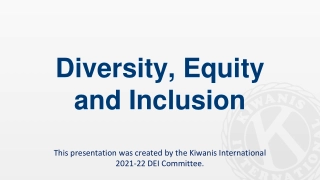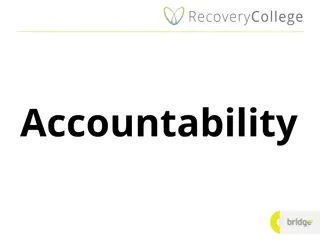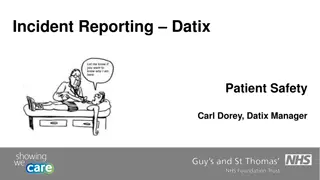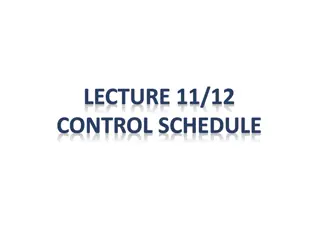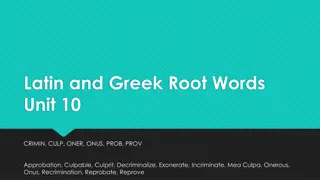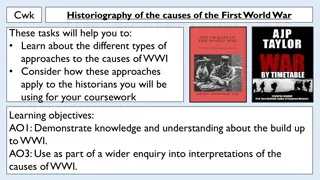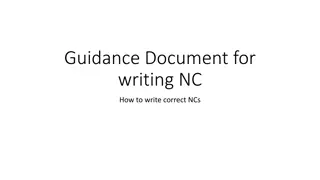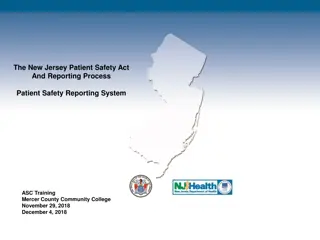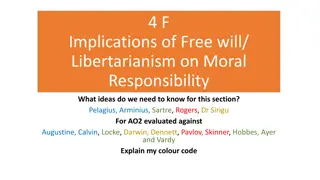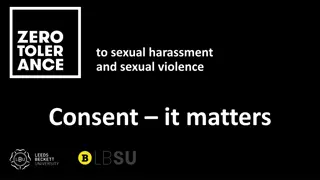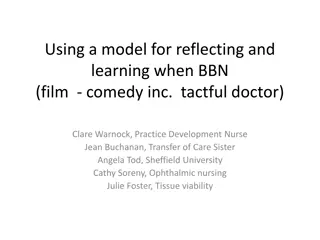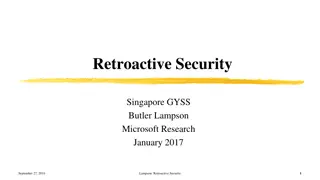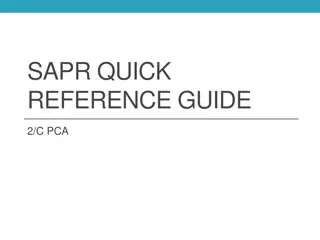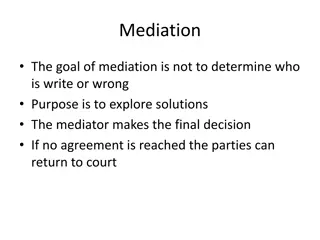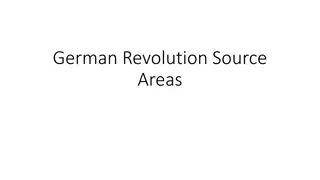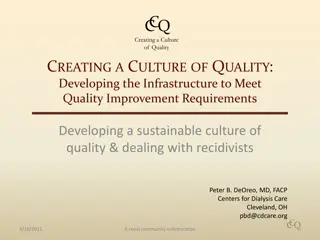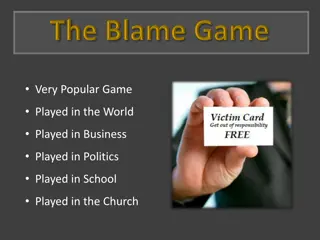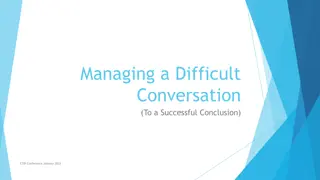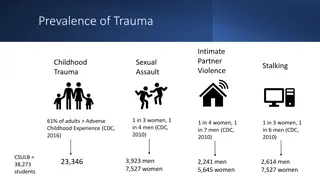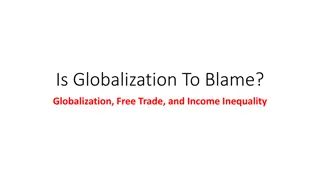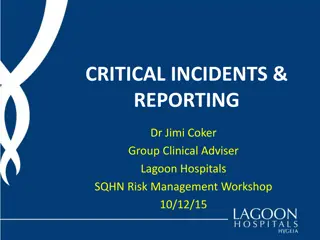Diversity, Equity and Inclusion
Explore diversity, equity, and inclusion through examples and resources for a healthy Kiwanis club. Guidelines promote active listening and respect for all identities. No blame, hidden agendas, or political stances. Kiwanis commitment to DEI highlighted.
2 views • 30 slides
Negotiations at the Paris Peace Conference: The Treaty of Versailles
The Paris Peace Conference of 1919 marked a significant event where the Treaty of Versailles was negotiated by the Big Three - Woodrow Wilson, Georges Clemenceau, and David Lloyd George. This treaty addressed key areas such as assigning guilt for the war, reducing armies, determining reparations, la
1 views • 19 slides
Embracing Personal Accountability: Key to Success and Growth
Understanding the essence of personal accountability is crucial in taking ownership of one's life and actions. It requires individuals to monitor progress, set goals, and seek support from others while avoiding blame and excuses. By embracing accountability, one can foster trust, responsibility, and
2 views • 10 slides
Understanding Incident Reporting in Healthcare
Incident reporting in healthcare is crucial for patient safety and organizational improvement. An incident can encompass a wide range of events that cause or have the potential to cause harm, loss, or damage. Reporting incidents, including near misses, allows for learning from both mistakes and succ
0 views • 10 slides
Insights into Project Management Practices
Observations in top and middle-level management reveal a tendency to place blame internally rather than externally. Questions arise regarding the handling of uncertainty in project estimation and the focus of companies on saving money over making money. The challenges of project management include s
0 views • 32 slides
Explore Latin and Greek Root Words Unit 10: CRIMIN, CULP, ONER, ONUS, PROB, PROV
Delve into the meanings and uses of Latin and Greek root words in Unit 10, including terms like approbation, culpable, exonerate, onerous, recrimination, reprobate, and more. Understand concepts related to crime, blame, guilt, onus, burdens, and proofs through examples and explanations.
0 views • 9 slides
Exploring the Passive Voice in English Language
The passive voice is used in English to shift the focus from the subject of a sentence to the object. It is commonly used when the agent of the action is unknown, to avoid responsibility or blame, and to enhance cohesion and coherence in writing. By starting sentences with given information and main
5 views • 9 slides
Understanding Insiders and Outsiders in Arab Political Economies
Examining core Arab countries outside the Gulf, this analysis delves into the unique features of Arab capitalism, highlighting low state capacity, heavy regulation, and segmented labor markets. State intervention plays a crucial role in creating insiders and outsiders, shaping a landscape of low ski
1 views • 56 slides
Approaches to the Causes of World War I: Historiography Overview
Explore various historical perspectives on the origins of World War I, from the blame placed on Germany in the Treaty of Versailles to the revisionist and anti-revisionist interpretations that emerged post-World War II. Delve into differing views on nationalism, imperialism, militarism, and alliance
0 views • 13 slides
Guidelines for Writing Effective Nonconformity Statements
Understanding what constitutes a nonconformity in auditing and how to effectively document it is crucial for corrective actions. The guidelines emphasize the importance of clear, informative nonconformity statements to facilitate problem-solving and root cause analysis, without assigning blame or pr
0 views • 8 slides
Understanding the New Jersey Patient Safety Act and Reporting Process
The New Jersey Patient Safety Act, enacted in April 2004, aims to enhance patient safety, minimize adverse events, and improve system/facility performance. It emphasizes confidentiality, promotes a blame-free culture, and encourages evidence-based practices. Healthcare facilities, including ASCs, ar
0 views • 71 slides
Moral Responsibility and Free Will Implications in a Contemporary Context
This text delves into the implications of free will and libertarianism on moral responsibility, examining the ideas of various philosophers and thinkers such as Pelagius, Arminius, Sartre, and more. It explores the concepts of moral agency, determinism, normative ethics, religious beliefs, and the c
5 views • 12 slides
Understanding Consent and Addressing Sexual Harassment
This educational material discusses the importance of consent in relationships, sheds light on the prevalence of sexual assault, and delves into the concept of shifting blame away from perpetrators. It emphasizes the need for respecting boundaries and supporting survivors of sexual harassment and vi
0 views • 11 slides
Compassionate Approach to Tackling Obesity: A Weight-Neutral Perspective
Explore a weight-neutral approach to addressing obesity, focusing on compassion rather than blame. Learn why weight-neutral interventions may be more effective in promoting long-term health and psychological well-being. Shift the conversation towards improving dietary quality and physical activity f
2 views • 13 slides
Overcoming Barriers to Disclosure of Sexual Violence
Understanding the barriers to disclosing sexual violence is crucial in providing support to survivors. Common obstacles include self-blame, fear of not being believed, and concerns about judgment from others. This case study illustrates challenges faced by a woman who was sexually assaulted and high
3 views • 9 slides
Versailles Treaty and Wilson's 14 Points in World History
Wilson's 14 Points aimed to prevent future wars by advocating for an end to secret agreements, self-determination for ethnic groups, and the establishment of a League of Nations. However, at the Treaty of Versailles, conflicting interests among world leaders led to a different outcome, with Germany
0 views • 14 slides
Reflective Model for Improving Healthcare Communication
Utilizing a reflective model in healthcare settings allows professionals to analyze past events, identify areas for improvement, consider contextual factors, and examine personal actions. The model helps in avoiding self-blame, promoting positive reflection, and exploring potential changes for bette
0 views • 21 slides
Retroactive Security Approach by Butler Lampson in January 2017
Retroactive security proposed by Butler Lampson addresses the limitations of traditional access control mechanisms. Emphasizing a focus on events that have actually occurred, this approach aims to improve real-world security by enabling accountability, blame assignment, and selective undo capabiliti
0 views • 20 slides
World War I and the Treaty of Versailles: Key Events and Consequences
The policy of glorifying power and militarism, the tensions in the Balkan Peninsula, Germany's leadership, causes of the United States' entry into World War I, impact of unrestricted submarine warfare, transition to total war, the end of the war with an armistice, the Treaty of Versailles assigning
0 views • 10 slides
Gender and Tolerance to Violence in Latvian Media: Analyzing Frames and Perceptions
This presentation delves into the discourse surrounding tolerance of violence in Latvia, examining how media articles and comments frame the issue in relation to gender norms. Through analyzing data from 2010 to 2018, it explores frames that justify violence, blame victims, and even humorize female
0 views • 11 slides
Analysis of Blame and Tragedy in Oedipus the King and Aristotle's Poetics
The question of blame is central in "Oedipus the King," where the city faces a plague and seeks accountability. Aristotelian concepts of tragedy, as outlined in "Poetics," delve into the structure and components of a tragic work, emphasizing plot development and cathartic emotions of pity and fear.
0 views • 28 slides
Analyzing Ronald Reagan's Rhetorical Approach in The Space Shuttle Challenger Tragedy Address
Explore the rhetorical analysis of Ronald Reagan's address following the Space Shuttle Challenger tragedy. The analysis delves into the speech's purpose, Reagan's handling of blame, balancing tragedy with exploration, and the importance of leaders addressing the nation in times of crisis.
0 views • 26 slides
Vocabulary Unit #11 Words and Definitions
Abstemious: Characterized by moderation and self-discipline in eating and drinking. Censurable: Deserving blame or correction. Contingent: Likely to happen but not certain, dependent on uncertain events. Corroborate: To confirm or substantiate. Denizen: An inhabitant or resident of a place. Discursi
0 views • 21 slides
Understanding Bystander Intervention and Victim Impact
This content provides a comprehensive guide on bystander intervention, highlighting the internal stages and effective strategies for bystanders to intervene in potentially harmful situations. It also explores the impact on victims of sexual assault, focusing on themes like control, self-blame, trust
0 views • 7 slides
Understanding Mediation in Kansas: A Comprehensive Overview
Mediation in Kansas is a process where a neutral third party assists parties in resolving disputes without assigning blame. This overview covers the purpose of mediation, statutory definitions, dispute resolution processes, types of mediation, and court rules related to mediation in Kansas. Details
0 views • 14 slides
German Revolution of 1918: Source Areas and Military Defeat
The German Revolution of 1918 saw a complex interplay of events, from military defeat to political maneuvers. The myth of the army being stabbed in the back, Ludendorff's attempts to shift blame, and the revolution from above orchestrated by elites all shaped this pivotal period in German history. D
0 views • 14 slides
The Stab in the Back Theory: Rise of the Nazis After WWI
The Stab in the Back Theory originated in Germany post-WWI, where people felt betrayed by politicians and generals for surrendering prematurely. Hitler used this theory to blame Socialists, Communists, and Jews, gaining followers by offering someone to blame for Germany's defeat.
0 views • 8 slides
Empathic Communication: Enhancing Connection Through Empathy
Enhance your communication skills through empathic listening tips and avoid empathy blocks to foster deeper connections. Slow down, put on your empathy ears, breathe, and listen longer before responding. Focus on responding with empathy first, prioritize connection over correction, and avoid diverti
0 views • 4 slides
Cultivating Quality Care: Strategies for Enhancing Healthcare Outcomes
Focus on developing a culture of quality in healthcare by emphasizing patient-centered care, data-driven improvement cycles, and open communication among care team members. Address common challenges such as the blame trap and the safety/quality conundrum, promoting a shift towards system improvement
0 views • 42 slides
Effective Strategies for Collaborating with Software Engineers
Learn the ten-step plan by Ken Norton for successfully working with software engineers, including tips on handling praise, blame, details, timing, processes, and communication. Embrace a collaborative approach to enhance productivity and team dynamics in software development projects.
0 views • 11 slides
The Blame Game - Recognizing, Confronting, and Overcoming
Explore the pervasive nature of the blame game played in various aspects of life, from business to politics to personal relationships. Discover the detrimental rules of the game, illustrated by historical and modern examples, alongside insights on breaking free from its cycle and taking responsibili
0 views • 5 slides
Mastering Difficult Conversations for Positive Outcomes
Handling difficult conversations effectively involves understanding the three key components: the "What Happened" conversation, the "Contribution System," and the "Feelings Conversation." By navigating these aspects skillfully, individuals can shift from blame and conflict towards productive communi
0 views • 16 slides
Understanding Trauma and Social Reactions in Cases of Violence
This content highlights the prevalence of trauma, including intimate partner violence, childhood trauma, sexual assault, and stalking. It discusses disclosures to friends and family, social reactions survivors may face, victim blame, and the importance of providing support and understanding to survi
0 views • 10 slides
The Impact of Globalization on Education and Income Inequality
Explore the relationship between globalization, free trade, education, and income inequality. Discover valuable insights on gender gaps in education, the most valuable bachelor's degrees, and the challenges posed by globalization. Delve into the debate on whether globalization is to blame for income
0 views • 25 slides
Managing Critical Incidents and Reporting in Healthcare Settings
This presentation discusses the importance of incident reporting in healthcare, focusing on critical incidents, factors contributing to errors, risk management components, fair-blame culture, human error, and the impact of adverse events. It highlights statistics on medical errors, emphasizes the ne
0 views • 44 slides
Understanding Shame and Child Sexual Abuse: Research Insights
Exploring the intersection of shame and child sexual abuse, this research presentation delves into the complexity of disclosures and implications for therapy and protection. Drawing on Shame Resilience Theory, the study examines adaptive and maladaptive shame responses, guilt versus shame dynamics,
0 views • 36 slides
This is Why Your Ford F-150 Heater is Not Working
If your Ford F-150 heater isn\u2019t working, several factors could be to blame, including low coolant, a faulty thermostat, a clogged heater core, or a malfunctioning blower motor. By diagnosing the issue and addressing it\u2014whether on your own o
1 views • 29 slides
Understanding Accident Investigations and Prevention
Workplace accidents and incidents can have severe consequences, making it crucial to conduct effective accident investigations. Jessica Schroder, a Risk Management Consultant at Aegis Corporation, emphasizes the importance of identifying root causes to prevent future accidents. The process involves
0 views • 61 slides
